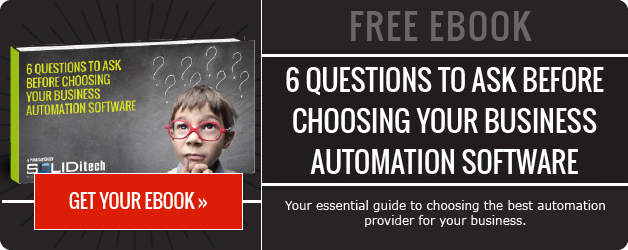Business automation offers an increasing array of benefits. As businesses need to perform ever more complex and labour intensive tasks, it becomes essential to automate manual processes. This requires specialist and highly functional automation software.
To achieve the highest rate of success, you need to be sure that you're investing in the right (a) software, and (b) software provider. Especially as that solution provider will soon become an integral part of your businesses future.
We've recently published a new eBook which details the '6 Questions to Ask Before Choosing your Business Automation Software' (download it here). It focuses on the key questions you should ask yourself and your potential supplier before making your final business automation decision.
One of the most important questions to ask is whether an off-the-shelf or customised automation solution would be better or you.
An off-the-shelf solution is one that already exists as a fully functioning package that you buy into. A customised solution is built for you, around your business requirements.
There are pros and cons for each which we've detailed below.
OFF-THE-SHELF (OTS)
| PROS | CONS |
|
Tends to be cheaper and quicker to set up than a customised solution |
Often, not all the features you need are included in a single piece of software, so you end up with multiple OTS's connected to each other |
|
Fixed structural and feature options that you buy into, giving you an existing automated workflow on which to base your processes |
Limited dashboard metrics. Separate pieces of software tend not to 'talk' to each other, passing and/or collating information. This means you're unable to get a good overall picture of your key business metrics in a great, single dashboard |
|
Established user base with good community forums and discussion boards |
|
CUSTOMISED
| PROS | CONS |
|
The solution is built for you, around your unique needs (based on the suppliers platform) and is more flexible to your needs over time |
Can be more expensive and take longer to build and implement |
|
Custom integration with existing applications |
As each installation is unique (with some module cross-over) there is not as much support from a customer user-base and you are reliant on the provider for support |
|
A single system that can do everything you need it to - No need to cobble together multiple pieces of OTS software. This also enables clear visibility of all your key metrics |
|
To make your decision, keep your business objectives in mind.
For example, if you want to implement a fairly simple automated customer service process, an off-the-shelf solution will probably suffice. Whereas, if you want to reduce revenue leakage by automating your complex billing and invoicing cycle, a customised solution might be more effective.
Find out more about the remaining 5 key questions you should ask yourself and your potential supplier before making your final business automation decision by downloading our latest ebook or find out more about automation by reading our post "Everything You Need to Know about Business Process Automation".








Comment